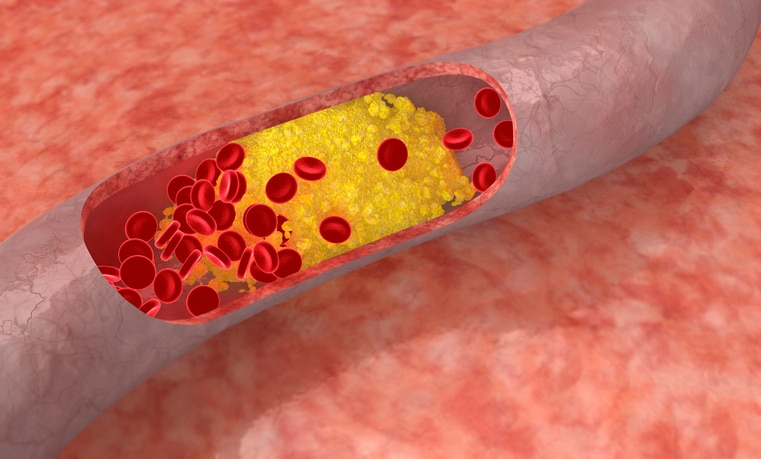For decades, cardiologists have considered “soft” plaque your heart’s worst enemy. This is plaque made up mostly of cholesterol and fatty compounds. It’s also called “lipid-laden.”
Doctors believed that soft plaque in coronary arteries was the kind most likely to rupture, block the flow of blood, and give you a heart attack.1
Statin drugs are prescribed specifically to prevent soft plaque.
But now, a new long-term study is turning conventional heart health wisdom on its head.
It found something that stunned cardiologists: It is hard plaque, not soft, that leads to heart attacks. Hard plaque is largely composed of calcium—not cholesterol.
Recommended for You: $10 Device Lowers Blood Pressure 15 Points
It may be the strangest trick you’ve ever heard to lower blood pressure. But multiple studies prove it works. All you need is a cheap $10 tool (which you can find on Amazon or at Target) and a few minutes each day. Find out more HERE.
Dr. Brent Muhlestein is co-director of cardiology research at the Intermountain Medical Center Heart Institute in Salt Lake City. He is one of the study’s co-authors. “We previously thought that lipid-laden soft plaque was more likely to rupture and cause heart attacks,” he said. “But based on our new research, it’s more the calcified plaque that appears to be associated with adverse cardiovascular events.”2
Researchers analyzed the composition of plaque from 224 patients who had diabetes, but no heart symptoms. They then followed the patients for almost seven years to see what kind of plaque—hard or soft—was a better predictor of heart problems.
Surprisingly, researchers found that calcified plaque was far more dangerous than cholesterol-based plaque.
Dr. Muhlestein says the results are a “game-changer” for heart disease treatment. It could mean that many people may be able to stop taking statin medications.
“A lot of patients may not require statin therapy, even though they have high cholesterol,” he said.
The study was presented recently at the American College of Cardiology Scientific Sessions in Washington D.C.
The One Heart Test You Need
The most common screening for heart health is a cholesterol test. But the new study shows that high cholesterol—even “bad” LDL cholesterol—is not as important as another heart marker. A better indicator is coronary calcium.
A calcium scoring test is a simple, painless screening that diagnoses hard plaque. It is a specialized X-ray that provides pictures of your heart. It shows calcium-containing plaque.3
Scores range from zero to over 400. If your score is 10 or less, you have a less than 10% chance of heaving heart disease. If your score is 11-100, you likely have mild heart disease.
Any score over 100 means you likely have heart disease and artery blockage. A score over 400 means you have a 90% chance that at least one of your arteries is blocked. Your risk of having a heart attack is very high.
The link between calcified plaque and heart disease is so strong that having a calcium score of zero is like “having a five-year warranty” against a heart attack, said Dr. Muhlestein. This holds true even if you have high levels of bad LDL cholesterol.[iv] [v]
Editor’s Note: There’s something else you should know if you’re worried about heart disease… This natural “warrior extract” boosts heart health without causing dangerous side effects.
Get all the details HERE.
Like this Article? Forward this article here or Share on Facebook.
References:
1https://medicalxpress.com/news/2017-03-potential-breakthrough-heart.html
2https://intermountainhealthcare.org/news/2017/03/major-study-of-atherosclerotic-plaque-deposits-shows-potential-breakthrough-in-determining-risk-for-heart-attacks/
3http://umm.edu/programs/diagnosticrad/services/technology/ct/cardiac-calcium-scoring
4https://intermountainhealthcare.org/news/2017/03/major-study-of-atherosclerotic-plaque-deposits-shows-potential-breakthrough-in-determining-risk-for-heart-attacks/
5http://www.nydailynews.com/life-style/health/daily-checkup-rise-coronary-calcium-scan-article-1.1457706

